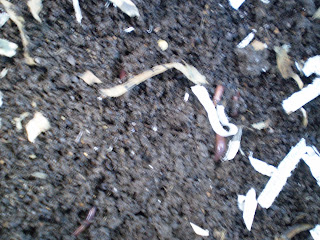Worm castings are what worms leave behind after feeding on my kitchen waste, and are a great, free and sustainable addition to your organic garden. Worm castings are a superior organic fertilizer full of nutrients and other properties that make for beautiful gardens.
Here is a video from Cornell University all about vermicomposting (the official term). It is about 10 minutes long, so pour yourself a cup of tea and enjoy!
Here is my little worm bin. I drilled holes in it everywhere, including the bottom. I think I'm going to drill holes in the top, too. That way the worms have even more air circulation.
Next I put my already-read newspaper through the shredder to make the bedding. I filled the bin about halfway full with newspaper and sprayed it down with water to moisten it. The paper should be moist but not wet. Then I added not just any worms, but red wiggler worms. I bought them from Rising Mist Organic Farm. Here is a downloadable quick overview of what to and what not to feed your worms: Your Guide to Vermicomposting
Can you see the worms? They have turned the newspaper bedding and my kitchen waste into poop, um.... castings. This batch is ready to harvest for garden compost.
Here's the inside of the worm bin. I scraped all the leftover bedding and food to one side and waited about a week or so for the worms to move to where the food was. Then I just scooped the poop into a bucket, picked out any stragglers and placed them back with their friends by the food.
Here's where I keep my worm bin. It is sitting on a boot tray by the fridge. Don't worry, the castings don't smell at all. Well, they smell, but like good earth, not like poop.
Vermicomposting is not only a lot of fun, but it is an easy way to produce your own great compost for your organic garden year round. It's also a great project to do with your kids. I hope my worm bin has whet your appetite to learn more about this sustainable gardening practice.






2 comments:
I have a warm compost and an ordinary garden compost. I have been thinking about worm composting, but somehow it seemed so complicated. But it should be fun for my daughter to watch how it works...
Hm.
-But I thought it should be several containers above each other? (I can't watch the film right now cause I'm in class wathing my students do a test.)
Yes, the double-decker worm bin is one way to do it. The reason for that is that when the worms are finished eating the food in the bottom bin they can migrate to the top bin with more food and bedding, leaving the castings in the bottom bin for harvesting. I kind of did the same thing by moving the food and bedding to only one side. I plan to post more detailed information.
The movie itself is less of a how-to and more about the benefits and science behind vermicomposting. I guess it's my inner nerd coming to the surface!
Post a Comment